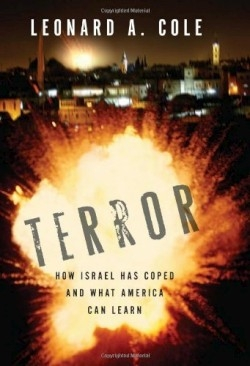Terror
How Israel Has Coped and What America Can Learn
A terror attack brings many challenges, some obvious and others less apparent. Those first to arrive on the scene, ranging from police and fire units to medical personnel, must secure the area, provide first aid to seriously injured victims, and—unless the attacker is a suicide bomber—try to catch the perpetrator before additional damage can be done. These actions, however, are not the end of the story. Hospitals must prioritize the wounded, for example. And everyone involved—from victims and their families, to first responders and bystanders—must deal with the psychological trauma that these horrible acts leave behind.
Alas, as terror medicine and bioterrorism expert Leonard Cole writes in Terror, practice helps a society learn to cope. Cole, the author of The Anthrax Letters, tells dozens of tales to convey the remarkable healing that follows Palestinian terror attacks in Israel. His wide-ranging interviews pay off with stories of people like Ora Cohen, a woman severely injured during a bus bombing in Jerusalem in 2003. Through his skilled presentation, covering victims and healers alike, Cole conveys the mix of revulsion and hope that accompanies the recovery process and argues for a more comprehensive American approach to post-attack counseling and psychological assistance. For example, in his chapter on ZAKA—an Israeli group that searches for body parts at terrorist bombing sites to aid burial rites—he notes the lack of a parallel in the United States, but nevertheless makes a good case that “techniques used to treat ZAKA workers [for post-attack trauma] are suitable in general for responders at terror events.”
Cole, however, overstates the applicability of the Israeli system to the United States and fails to persuade readers that America should adopt the training and preparedness methods Israelis have developed under the near constant threat of terror bombings. As one example, in chapter twelve he argues unconvincingly that the United States should reinstitute the military draft as a step toward building “national connectedness,” which he contends would increase Americans’ resilience in the wake of terror attacks. He too quickly advocates a costly reconstruction of American institutions to deal with the type of terrorism Israel faces—frequent suicide bombings as part of a complex conflict over land, identity, empowerment and other factors; rather than the unique threat confronting the United States.
Terror will appeal to readers seeking to understand the immediate human cost of terrorism and learn how Israel’s medical and psychological professionals cope with lingering effects. By delivering the story through the eyes of terror victims and those who assist them, Cole will move many readers emotionally even if he falls short of persuading them that all Israeli measures to respond to terrorism apply to America.
Reviewed by
David Priess
Disclosure: This article is not an endorsement, but a review. The publisher of this book provided free copies of the book to have their book reviewed by a professional reviewer. No fee was paid by the publisher for this review. Foreword Reviews only recommends books that we love. Foreword Magazine, Inc. is disclosing this in accordance with the Federal Trade Commission’s 16 CFR, Part 255.

